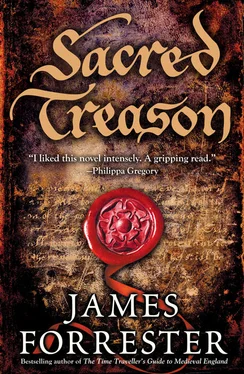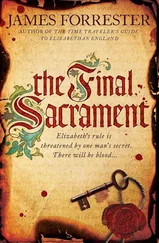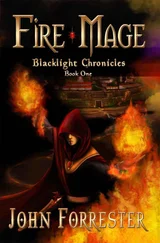James Forrester - Sacred Treason
Здесь есть возможность читать онлайн «James Forrester - Sacred Treason» весь текст электронной книги совершенно бесплатно (целиком полную версию без сокращений). В некоторых случаях можно слушать аудио, скачать через торрент в формате fb2 и присутствует краткое содержание. Жанр: Исторический детектив, на английском языке. Описание произведения, (предисловие) а так же отзывы посетителей доступны на портале библиотеки ЛибКат.
- Название:Sacred Treason
- Автор:
- Жанр:
- Год:неизвестен
- ISBN:нет данных
- Рейтинг книги:4 / 5. Голосов: 1
-
Избранное:Добавить в избранное
- Отзывы:
-
Ваша оценка:
- 80
- 1
- 2
- 3
- 4
- 5
Sacred Treason: краткое содержание, описание и аннотация
Предлагаем к чтению аннотацию, описание, краткое содержание или предисловие (зависит от того, что написал сам автор книги «Sacred Treason»). Если вы не нашли необходимую информацию о книге — напишите в комментариях, мы постараемся отыскать её.
Sacred Treason — читать онлайн бесплатно полную книгу (весь текст) целиком
Ниже представлен текст книги, разбитый по страницам. Система сохранения места последней прочитанной страницы, позволяет с удобством читать онлайн бесплатно книгу «Sacred Treason», без необходимости каждый раз заново искать на чём Вы остановились. Поставьте закладку, и сможете в любой момент перейти на страницу, на которой закончили чтение.
Интервал:
Закладка:
“If you are asking whether your men may apply torture…”
“It is a delicate subject, I fully understand. Some of Draper’s friends are wealthy.”
“You also appreciate that her majesty does not approve of painful techniques.” Cecil picked up his cup of wine and took a sip. He set the cup back down again, turning it between his fingers on the table. “However, she does not approve of rebellion either.”
“So, if the enmity of these men is sufficient to warrant it?”
“Then God will thank you for doing what you have to do.”
Walsingham nodded. He turned to leave. Cecil’s voice made him pause.
“Do not forget, Francis, that as long as Elizabeth is queen, God is not just all-forgiving. He is Protestant too.”
7
Clarenceux walked cautiously through the darkness of his stable yard, holding the unlit lantern in his left hand and reaching out with his right for the wall. Rain dripped down the side of his face. He felt stone and moved to his left until he touched the wooden gate. It was unfastened. The stable lad must have failed to close it properly.
A shutter banged somewhere; otherwise, he could hear nothing except the incessant rain. He moved slowly along the dark of Fleet Street, running his hand along the front of his neighbor’s house. He wished it were not quite so dark-just a clearer sight of a roofline would have helped.
He wondered which way he should take. How was he to get past the city gates? They would be closed, and the city walls were impossibly high. He knew that certain houses abutted the walls but he had no idea where he might climb up. He had no option but to find the door by which Machyn himself had come, by the Cripplegate elm. Machyn must have gone back that way, returning to his house. To his wife, Rebecca, and son, John.
Clarenceux could just make out the shadowy shape of St. Bride’s Church and the line of the city wall along the far bank of the Fleet, leading down to the Thames. He could hear the water of the river gushing under the bridge ahead. Knowing the road well, he walked a little faster with his arms out in front of him in case he should trip over some unseen obstacle in his path.
Here was the bridge. The river below was in full spate. He could smell the refuse that littered the banks and see the shadow of the city walls. Some nights when the weather had been better, he had stood at this spot and looked down at the Thames, seeing the moon in the water. Not tonight.
On the city side of the Fleet, the wall made a sharp turn and moved away from the river up the hill to Ludgate. Abutting the wall were two lines of houses, one behind the other. He walked on, wiping the water from his face, until he came to the looming blackness of Ludgate itself. The gate was shut fast, but Clarenceux was reassured: he was cold and wet but he knew where he was. He turned and followed the line of houses built along the wall to the north, along the line of the Old Bailey.
He came to a corner. The tall shadow on his right was Newgate. Muffled shouts came from within a building nearby; a fight must have broken out in the prison. He sighed, despondent. At this rate it would take him all night to reach Machyn’s house.
Ahead was the gate of the old priory of St. Bartholomew the Great. Once it had been a beautiful church. He cursed the old king-as he always did when he came here-for Henry the Eighth had ordered the destruction of the nave and all the abbey buildings. Twenty years had now passed; what was left was a paltry wreck. That was the thing that enraged him about Protestants. They might speak from conviction, and they might seek God’s will just as fervently as those of the old religion-but then they recklessly destroyed things of divine beauty. That could not be done with God’s blessing. They spoke for themselves, not with God in their hearts.
He wiped his face and leaned against a wall. Ahead there was an intense dark shadow-St. Giles’s Church; it would not be much further to the elm. He could see the outline of the city’s north wall and Cripplegate ahead. He made his way toward it until he felt the cold stone of the gate tower beneath his hand. He stepped carefully forward, slipping in the mud and pressing himself against the wall. He sensed the elm, which grew from the side of the bank, and then felt its bark. He moved between it and the wall. Here was the door, still unlocked. It creaked open, and he went through.
He was now in a dark, sheltered yard, somewhere just inside the north wall of the city, as blind as he had been when he first stepped out of his house. He reached up and felt the wet shingles of a low roof. It must be a stable of some sort, or the blacksmith’s forge. What’s the smith’s name? Lowe. Not that he is likely to appear now, not in this weather.
Clarenceux’s knee struck stone. He bent down and felt a large water-filled cistern. Water for the forge. He moved around it; not far away was another door. He found the latch and opened it tentatively. He closed the door behind him and started to walk down the right-hand side of the street.
Holding the unlit lantern in his left hand, he ran his right over the walls and shop fronts, doors and stone pillars. He bumped into barrels, mounting blocks, carts, cases, and piles of wood. His ankle clipped a crate lying in the darkness in the street. At one point he slipped and fell in the mud, landing on his hands and knees in the wet slime, fumbling around in the dark for his lantern and hat.
Why am I doing this? Machyn’s problems are his own.
No. He needs my help. And despite his age, he managed this journey in the dark. So I can too.
A dog started barking nearby. Trembling, he reached out and felt the stone of a pillar. It was the church gate of St. Mary Aldermanbury.
O blessed savior Jesus, help me.
He leaned against the church wall, gasping. He felt pain in his hand and realized he was grinding his palm into the stone of the church wall. What was happening to him? Fear. To go on would be to leave the comfort of the church and enter a deeper, malevolent darkness: a darkness in which he would be as fully visible to the Devil as if it were daylight, and all the iniquities of the city at night would be invisible to him.
8
Lying in the darkness, Rebecca Machyn wiped the tears from her face. She turned in the narrow bed. What have we done to deserve this?
She remembered Henry’s words, and his kisses. And his tears. And the emptiness of the words he had spoken-how his reassurances had sounded false and shallow, and yet how deeply distressed he had been.
She had done as he had said. Mistress Barker had been very good to her, as usual. She had let her have a chamber at the front so she could watch over her own house. Rebecca had heard people passing several times and knocking on the door. But if Henry had returned, he was not answering their calls.
She tried to remember happier times. The day she married Henry: it had been a bright January morning, nearly fifteen years ago. But every memory of that day led inexorably to the first terrible memory of her marriage. Mary lying there, eighteen months old, forever motionless in the cot. The stillness of death. It was as if, in dying, the child had become a cruel hoax played upon her by the Devil-as if the child had never really had life but only the appearance of it. And then Katherine at the same age. An object in the cot with its eyes open. No longer hers. No longer female or even human.
How good Henry had been to her then. How understanding.
The third time it had happened-three years ago-she had wanted to die herself. To be with her babies, to open the door to heaven for them. If it hadn’t been for Henry, I would have done it. I would have thrown myself off the bridge. Only he stopped me. Wise Henry. He knew. He had lost four of his five children by Joan, his first wife, and then Joan herself had died. My three girls were not even half of his sorrow. He still prays for her and for all seven of his dead children. He does not deserve even more grief.
Читать дальшеИнтервал:
Закладка:
Похожие книги на «Sacred Treason»
Представляем Вашему вниманию похожие книги на «Sacred Treason» списком для выбора. Мы отобрали схожую по названию и смыслу литературу в надежде предоставить читателям больше вариантов отыскать новые, интересные, ещё непрочитанные произведения.
Обсуждение, отзывы о книге «Sacred Treason» и просто собственные мнения читателей. Оставьте ваши комментарии, напишите, что Вы думаете о произведении, его смысле или главных героях. Укажите что конкретно понравилось, а что нет, и почему Вы так считаете.












